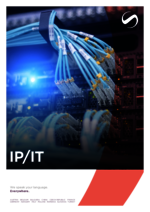IP / IT Law
The field of Intellectual Property includes both technical property rights, such as patents, and non-technical property rights, such as trademarks, designs, and copyrights. Intellectual property rights secure the economic investment in an intellectual invention. Typically, IP lawyers are also active in competition law for this reason. In practice, there are few lawyers covering all fields. At SAXINGER, this know-how is bundled into the practice group IP / IT + COMPETITION.
IT law relates to legal issues regarding information technology and counts as a cross-sectional area. For that reason, it includes relevant subdivisions of all main legal areas such as contract law, data protection, and IP law.
With the right strategy and in-depth legal advice from SAXINGER, you will ensure your company’s success in these legal areas. This is essential because innovations are a key driver of growth and thus must be sustainably used and protected. This is how you can effectively take action against counterfeit products and fakes that cause significant economic damage worldwide. Privacy and data security are now an essential element of business activities and can pose a significant liability risk without sound legal advice.
Our IP and IT Services
- Contract design: negotiation, review, and establishment of legally certain software development and license agreements, data license agreements, data pooling, or holistic and project-related data-protection concepts.
- Advice and legal support when introducing new software solutions.
- Advice on the management of digital risks in financial markets (Digital Operational Resilience Act, DORA) for financial companies and ICT providers such as cloud service providers.
- Advice and support for online sales systems (online shop) and reseller structures.
- Advice on and development of brand strategies.
- Advice on the registration and defence of your property rights. This is how to secure your company’s growth and investment in R&D.
- Enforcement of rights under civil law with preliminary injunctions and litigation.
- Cooperation with law enforcement agencies and customs effectively to combat violations of the law.
- Advice and representation for claims made against you by third parties (for example, cease and desist, opposition to your trademark application).
- Advice on all questions about the internet, domains, e-commerce and data protection, digitalisation, and resilience.
Consultancy Needs in IP & IT Law
Nowadays, protecting and defending intellectual property is fundamental to corporate risk management. The right legal action protects your company’s valuable assets by safeguarding innovation, brand names, and creative works and by preventing unlawful use by competitors. At the same time, IT legal advice is essential to fulfil privacy regulations, to design IT contracts in a legally certain way, and to protect against cyberattacks, which ensures the company’s comprehensive legal protection and long-term stability.
IP and IT legal advice are important in the following situations:
- As part of compliance with new laws and regulations (DORA, Data Act).
- For an intended corporate transaction.
- To protect your intellectual property such as ideas, trademarks, patents, and software.
- When creating or intending to enter into contracts and licensing, and when advising and negotiating agreements and transfers of technology and/or of data.
- When developing and evaluating data-protection concepts and managing data risks or a data breach.
- For legal disputes or violations of your rights by other competitors.
Our IP & IT Expertise
We strive to work closely with you and your management team to understand your business and products and to best represent your interests. Our focus in IP and IT law is especially on the following areas:
- Contracts for the grant and transfer of rights of use under copyright law, particularly license and cooperation contracts – Copyrights cannot be transferred, but rights of use to a work can be granted by means of a license. License agreements allow the licensee to use the work on certain conditions; cooperation agreements often involve joint projects in which the rights of use must be clearly defined and distributed.
- Legally certain design of license agreements in IT law – License agreements must detail the rights and obligations of all parties, including licenses of use, maintenance, support, and liability issues. Misunderstandings must be avoided and content must be formulated accurately to avoid legal and financial consequences.
- Software development agreements – A well-written agreement for the creation and delivery of software is relevant to circumvent legal disputes and misunderstandings about the process.
- Know-how contracts – In IT, companies often share and transfer technical knowledge. Know-how contracts ensure the protection of trade secrets and intellectual property of all parties involved; a legally valid contract design minimises the risk of disputes and unauthorised use.
- Digital Operational Resilience Act (DORA) - Virtually all regulated institutions and companies in the European financial sector fall under DORA. Additionally, DORA unites various requirements on institutions and companies in terms of cybersecurity, ICT risks, and digital operational resilience.
- Intellectual property protection – Authors and inventors have exclusive property rights to recognise their creative achievements and provide economic benefits to owners. For that reason, these ownership rights in intangible assets must be protected by registration to protect them from unauthorised use.
- Trademark law – Trademarks identify a product or service (logos, names, slogan) and confer on the owner the exclusive right to use the trademark in business. Companies must register their trademarks to protect them; additionally, trademark law contains civil and criminal rules that owners can assert for trademark infringements.
- Media law – Media law creates a legal framework that includes the production and distribution of content (radio broadcasting, press, film, digital media). The essential components are the protection of personal data and the safeguarding of personality rights that companies must take into account. Violations may result in lawsuits and damages.
- Copyright – Copyright grants the copyright holder the sole right to distribute and reproduce a work. In the case of copyright infringement, legal advice is needed to claim damages. Consultation is also meaningful when purchasing licenses.
- Patents – With a patent, an owner legally ensures that the protected invention cannot be produced, used, or sold without permission. A patent application must be detailed and precise to ensure full protection and it also requires extensive patent research.
- Right of use – The right of use (or utility model right) represents a cost-effective alternative to patent protection, but it offers a smaller scope. Rights of use are useful for inventions that may not meet the high requirements for a patent’s novelty and inventive step.
- Registered design right – This right refers to the external appearance of products (shape, colour, contour, surface texture, etc.). Owners have the exclusive right to use it and to prohibit third parties from using it.
- Immediate effect of preliminary injunctions at trade fairs, including in trade fair cities - A preliminary injunction can ensure that the distribution of infringing products ceases. This effectively protects rights holders and prevents further damage – and is especially important in trade fair cities where piracy and unfair competition practices are common.
- Domain law – Proper domain registration is critical to avoid litigation. Domain law ensures that domain names do not infringe trademark rights and are not used for unfair competition.
- E-commerce law – Companies must ensure that their online business model and practices comply with legal requirements. E-commerce law offers the basis for this and it regulates aspects such as contracting, consumer protection, data protection, and electronic payments.
- Privacy – Protecting personal data from abuse and unauthorised use is a legal requirement for companies. In Austria, data protection is subject to the Data Protection Act (DSG) as well as the Europe-wide EU General Data Protection Regulation (GDPR).
- Data Protection Impact Assessment – With a Data Protection Impact Assessment, companies assess the risks that data processing entails for the rights and freedoms of individuals. The effects of planned data processing in terms of data protection must be evaluated and appropriate remedial measures must be taken.
- Trademark differentiation and priority agreements – These agreements define how and in which geographic or material areas the respective rights may be used. This helps companies avoid conflicts with other brands or businesses.
- Competition law – Companies must guarantee business practices that comply with legal requirements. Competition law thus includes regulations against unfair competition, industrial property rights, and regulations to prevent the formation of cartels. Competition law is also an essential standard in contract design, for instance, in the area of establishing distribution systems.
References and Success Stories
We stand by our clients’ side with expertise and commitment in IP and IT law. The following are some of our most recent successful clients.
SAXINGER advised Raiffeisen-Landesbank Steiermark AG on the restructuring of the IT infrastructure to create a joint IT company with Raiffeisenlandesbank Oberösterreich Aktiengesellschaft
Specifically, SAXINGER supported the merger of Raiffeisen Informatik Center Steiermark GmbH with GRZ IT Betrieb GmbH, which was subsequently renamed RAITEC GmbH. The firm advised Raiffeisen-Landesbank Steiermark AG on legal and regulatory issues of the transaction.
Advice provided to Oberösterreich Tourismus GmbH on the registration of the combined trademark "Oberösterreich".
SAXINGER supported the registration of the new combined trademark and took over the legal consultation on providing proof of reputation in trade. In particular, we succeeded in providing proof of reputation by thoroughly substantiating the great reputation of the trademark beyond Upper Austria.
Consultation of PJ Messtechnik GmbH on entering into a research and cooperation agreement
SAXINGER advises PJ Messtechnik GmbH (PJM) on the development and negotiation of an R&D contract to develop a new automatic freight train system solution, which was concluded with SBB Cargo and Rail Cargo Wagon Austria GmbH (RCW) in May 2017.
Contact and Consultation
SAXINGER’s IP/IT team provides you with the full range of IP and IT legal consulting to keep your innovations safe. With our law firms in Graz, Linz, Salzburg, Wels and Vienna, we see to it that your rights and technologies are protected, used, and defended in court.



